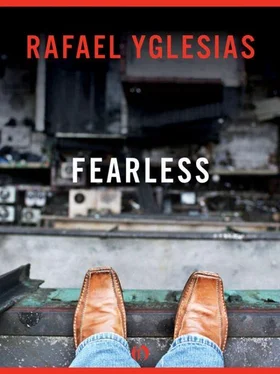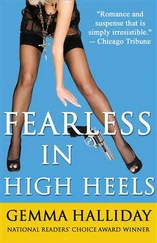“It’s so simple to you,” Max commented.
Brillstein wrinkled his pale forehead and comically raised his skinny eyebrows up to the lines. “Simple…?”
“Jeff brought in the business. He died. So I had to close the business.”
“Mr. Klein, I know you’re a sensitive and honest man. But those are the facts. No matter what other reasons there may be, the fact is: the plane crash brought an end to your business. Under the law you’re entitled to be compensated for such a devastating consequence. ”
“I have been compensated. I got the insurance money.”
“That isn’t admissible to a jury. As far as they would know you lost your partner and your business and that’s it.”
“It’s all a lie.” Max smiled wanly. His head no longer hurt. He noticed the absence of pain and then he realized that his sight, which had been doubled for two days after the accident and blurry since, was suddenly clear. He could see distant objects well. He sat up with excitement. He scanned the low buildings near the water and saw them first as shapes: rectangle, square, triangular lot; then in height: five stories, four, double-height warehouse; then the details of their condition: bad, bad, bad. Nothing to look at. If only his room faced Manhattan he could enjoy its variety of size, and at night, wonder about the life of its lights.
“It’s not lying,” Brillstein said, flitting back and forth along the foot of Max’s bed. “I don’t want you to think that there’s anything dishonest about your compensation. That’s in your head. I don’t know about your head, I’m not a psychologist. In fact — speaking of psychologists — I need you to do some psychological testing to strengthen our case. I need you to take a simple test, it’s really just answering a questionnaire. I can have the hospital psychologist do it if you like.”
“Sure,” Max said. He was up to this struggle. He looked at Brillstein and smiled.
“Good, good, good.” Brillstein flipped his notebook shut. He put a finger on his bare forehead; the skin crinkled around it as he frowned. “Did we discuss a figure? I don’t think so. It probably isn’t important, but I just need to know when I talk with them. Does a two-million-dollar settlement seem low to you?”
“You’re kidding,” Max said.
“Too low?” Brillstein said fast.
“Low!” Max chuckled. “It’s ridiculously high.”
Brillstein relaxed. “We’re talking about your expected after-tax earnings over your prime earning years. The Nutty Nick stores deal alone was a million-dollar loss.”
“We didn’t have that job.” Max grunted. “Aren’t they laughing you out of their offices with this stuff? I mean, my share of Nutty Nick wouldn’t be a million-dollar net.”
Brillstein had brought his forefinger down to his lips and he nibbled at the nail. “No?” he mumbled and then flipped his notebook open. “In his deposition the CEO of Nutty Nick says your and Mr. Gordon’s fee would have been two million dollars over the course of the years of work he had planned. You were a fifty-fifty partnership, correct? ”
“But we didn’t have that job. He hadn’t seen—”
Brillstein shook his pad. “In the deposition he says he planned to hire you, but he couldn’t because of the accident.” Brillstein smiled so widely he showed teeth. A calm happiness raised his lips. His eyes sparkled. “It’s a strong case,” he said without bluster.
“For Nan it’s a strong case,” Max said. “Jeff’s dead. He can’t work. But let me ask you something. Unless you prove I’m unable to work, isn’t my case weak?”
Brillstein put his notebook away. “Not necessarily. Just because you’re able to work doesn’t mean you can earn the same kind of money as you did with Mr. Gordon. And it doesn’t address the issue of the loss of the Nutty Nick stores contract.”
Max nodded solemnly. Brillstein now paced back and forth in a pattern that took him closer to the door with each pass. Max gestured for him to return to his bedside. Brillstein stopped. He paused and looked curious. Max repeated the gesture. Finally, Brillstein walked to the side of the bed. He held himself stiffly, though, his shoulders back and his head leaning away, as if ready to run. Max said quietly, “You get a third of the settlements, right?”
Brillstein pursed his lips gravely and nodded vigorously. The expression suggested that he disapproved of this fact.
“You’re going to make a big score with Nan’s case and Carla’s case. Do you need money so badly that you’re willing to have me declared insane just to make more money out of me?”
For a moment Brillstein did nothing but blink his eyes. Abruptly he sat down in the plastic chair Max’s mother had moved beside his bed. Brillstein rubbed his forehead with his index finger and studied Max. He seemed to come to a conclusion. He exhaled with a rush of words: “I told you these kinds of cases are almost always settled. And that’s true. But sometimes one side or the other decides not to compromise, to go the whole route. Not necessarily because of the merits of the argument. It’s for the future, for credibility. If you get a reputation for always settling, of being afraid to go to trial, then you can be taken advantage of. I’m up against heavy hitters. Their case stinks. We still don’t have the official final judgment of the NTSB but that isn’t legally binding anyway. All the data is in and it shows that it was negligent maintenance that caused the engine to come apart and wipe out the hydraulics. So TransCon is going to be on the hook for this. They should settle. They know it. They’ve already settled seventy-five percent of the suits — got them cheap if you ask me. They did it in a bunch with the two big firms, like a discount sale, using three formulas depending on age. Most anyone got was six hundred thousand. They paid a hundred thousand for the children.” Brillstein shook his head with disgust. “They may—”
Max was impatient with his tedious logic and cut him off—“They may go to trial with you to prove a point, since they’re safe on the other cases if they lose.”
Brillstein snapped his fingers and then pointed at Max. “You got it. Also, I’m working on new law here. Well, not new. There’s been two rulings so far, but not for airplanes. Have you ever heard of posttraumatic stress syndrome?” Max shook his head no. “You’re suffering from it!” Brillstein said eagerly and with a hint of delight, as though it was clever of Max. “We can sue them for compensation for the syndrome’s effects. It’s a gamble for them but they may decide to take it to trial and beat it.”
“ But if they lose on that point they’re screwed in the future, no?”
Brillstein folded his arms. He smiled without showing teeth. “They’re screwed either way. If they settle on this issue, even if we agree to keep the numbers and the argument confidential, other lawyers will find out and use it again.”
“You know,” Max said. He shifted in the bed, to get on his side and face Brillstein. The sheets and all its plastic undercoverings rustled and swished. He let their surf noise the down before continuing. “I’ve never done anything really good or useful in the world.”
Brillstein nodded eagerly, almost encouragingly.
“But at least I’ve never actually added to what’s bad.”
Brillstein’s mouth pursed. His eyes were offended. “Maybe you don’t understand,” Brillstein said softly, but with menace. “If you contradict me on Nutty Nick or Mr. Gordon’s ‘key man’ status you’ll only be hurting Mrs. Gordon.”
Max said nothing.
“You’ll leave me no choice but to take the line that you’re not in your right mind.” Brillstein stood up. His mouth had gotten very tight and severe. He looked too small to achieve the threatening effect he wanted. “Your wife and I have talked about this. There’s a lot of evidence you’re unwell.” Brillstein became nervous again. He grinned and said, “We’re both tired and tired talk is no good. Let me know when you want the psychologist to bring you the questionnaire. Get some rest.” Brillstein scurried out in his brown suit, a small, even cute creature. But the lawyer had meant what he said. And Max knew that sometimes the littlest animals were the most determined and the most vicious.
Читать дальше












